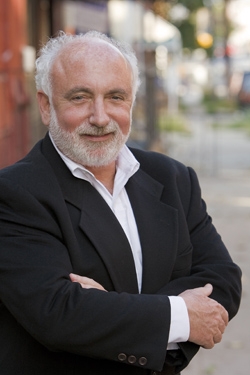Psychology professor honored for exceptional scientific achievement impacting the lives of young people
Laurence Steinberg awarded $1 million research prize by Jacobs Foundation
Laurence Steinberg, Distinguished University Professor and Laura H. Carnell Professor of Psychology at Temple University, has been named the recipient of the inaugural Klaus J. Jacobs Research Prize in the field of youth development. The prize was announced today by the Jacobs Foundation, one of the largest foundations in Europe.
Presented to individuals in recognition of outstanding scientific accomplishments that represent groundbreaking contributions to improving the lives of young people, the Jacobs prize carries an award of one million Swiss francs, the equivalent of one million U.S. dollars.
“I am honored to have the work my colleagues and I have done recognized,” said Steinberg, a member of Temple’s psychology faculty since 1988. “But I’m also proud that our field is receiving this recognition. The Jacobs prize draws attention to the fact that the scientific study of adolescent development is an important enterprise.”
An international, cross-disciplinary jury composed of seven scientists from leading research institutions around the world selected Steinberg as the prize beneficiary. The prize is intended to provide financial support for continuing research on youth development.
“It is with tremendous pleasure and pride that we award the first Klaus J. Jacobs Research Prize to Professor Laurence Steinberg,” said Dr. Bernd Ebersold, CEO of the Jacobs Foundation. “A trailblazer in the field of developmental psychology, Professor Steinberg exemplifies the foundation’s commitment to combining research, application, and active communication to improve the lives of young people. It is our hope that this prize will enable Professor Steinberg to extend his extraordinary scientific contributions and continue to support the development of children and adolescents around the world.”
An internationally recognized expert on psychological development during adolescence, Steinberg is a former President both of the Society for Research on Adolescence and the Division of Developmental Psychology of the American Psychological Association.
He is a frequent consultant to state and federal agencies and lawmakers on juvenile justice issues and public policy.
The U.S. Supreme Court’s 2005 ruling in Roper v. Simmons, abolishing the juvenile death penalty, relied significantly on the argument advanced by Steinberg and his colleagues that adolescents are fundamentally different from adults in ways shown by scientific studies of brain and behavioral development.
Steinberg also served as scientific consultant on the amicus curiae brief submitted by the American Psychological Association in Sullivan v. Florida and Graham v. Florida. These landmark juvenile justice cases, argued before the U.S. Supreme Court on Nov. 9, raise questions about the constitutionality of sentencing juveniles to life imprisonment without the possibility of parole.
“In many respects adolescents are just as smart as adults. But it is crucial to understand that brain systems responsible for logical reasoning and basic information processing mature earlier than systems responsible for self-regulation and the coordination of emotion and thinking,” said Steinberg.
Compared to adults, adolescents are more susceptible to peer influence, less oriented to the future, more sensitive to short-term rewards, and more impulsive."
Steinberg’s research findings have not only transformed legal policy and practice, they have also changed the way society thinks about teenagers. In addition to his current work on teen decision making, risk taking and crime, Steinberg has been a leader in the study of parent-adolescent relationships, school achievement, and the employment of teenagers in after-school jobs. He currently chairs the National Academies’ Committee on the Science of Adolescence.
Steinberg is the author or co-author of 11 books, including Adolescence, the leading college textbook on adolescent development, now in its eighth edition; You and Your Adolescent: A Parent's Guide for Ages 10 to 20; Beyond the Classroom: Why School Reform Has Failed and What Parents Need to Do, which The New York Times cited as one of the decade’s most important books on education; The Ten Basic Principles of Good Parenting, which has been translated into ten languages; and Rethinking Juvenile Justice.
“While I have not made specific plans, I know that I will use the prize to extend our research on adolescent development into places outside the United States to see how much of what we are finding generalizes to adolescents growing up in very different contexts,” he said.
